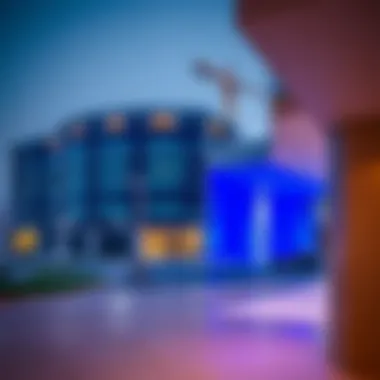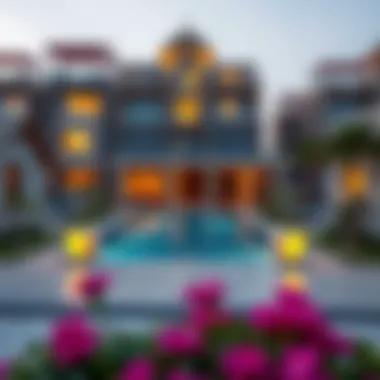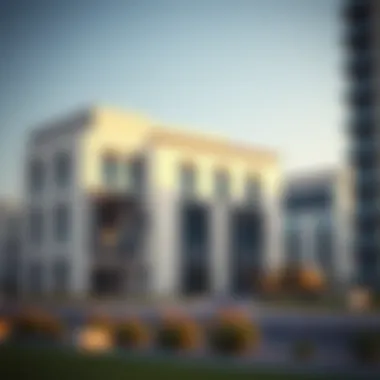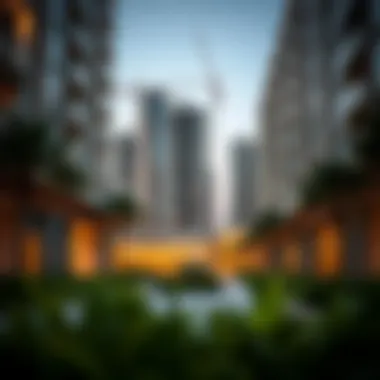Discover Dubai's Leading Builders: A Detailed Guide


Intro
In the thriving city of Dubai, construction and real estate have become the backbone of its rapid development. As skyscrapers seem to stretch endlessly into the sky and luxurious villas line the shores, the builders behind these impressive structures are equally important. Evaluating who these builders are, their reputations, and their contributions to the urban landscape can provide invaluable insights for anyone interested in this vibrant market.
Understanding the dynamics of the construction industry in Dubai isn’t just for seasoned investors or developers. Homebuyers, expatriates, and even everyday folks contemplating a move can benefit immensely from this knowledge. The essence of this article is to dissect the characteristics of the finest builders in the region, spotlighting their key projects, methodologies, and the overarching trends they adhere to.
As we navigate through the layers of information, we will provide context behind the current market dynamics, outlining what makes a builder stand out in this competitive field. Furthermore, we will delve into property investment strategies, enabling readers to know not only who to trust but also how to strategically approach their investments.
Now, let’s dive into the various market trends and analysis that define the current state of Dubai’s construction sector.
Understanding Dubai's Real Estate Landscape
The real estate landscape in Dubai is not just an intricate web of buildings; it's a dynamic environment that reflects both the aspirations of its residents and the ambitions of its developers. As one of the fastest-growing economies in the world, Dubai is a melting pot for opportunities, attracting investors and expats alike. Understanding this landscape is crucial for anyone looking to navigate its complexities, whether for personal investment or professional dealings.
The property market here is shaped by a unique mix of local culture and global influences. Key factors such as government regulations, socioeconomic trends, and technological advancements play pivotal roles in shaping how this market evolves. Here are a few considerations:
- Government Support: The UAE government frequently introduces new policies to encourage foreign investment, making property ownership and development more accessible to expatriates.
- Economic Diversification: Unlike traditional markets, Dubai's economy is not solely reliant on oil. The push towards tourism, trade, and technology has expanded the real estate opportunities.
- High Demand, Low Supply: The allure of living in a city that boasts towering skyscrapers and luxurious resorts results in a demand that often outpaces supply, subtly driving up property values.
For investors looking into Dubai's real estate, these dynamics are worth pondering. They create opportunities for appreciation and development, but also come with inherent risks. As construction booms, many may wonder how to choose the right builders or understand the market functioning.
The Dynamics of Dubai's Property Market
When diving into the dynamics of Dubai's property market, it's essential to grasp the continual flux of supply and demand. The market is characterized by distinct cycles, influenced by global trends, local needs, and the ongoing ambitions of developers. As the city gears up for future events like Expo 2030, one can anticipate even more sparks of development igniting across the skyline.
- Residential vs. Commercial: The residential property market has recently seen a surge in demand for villas and townhouses, while commercial properties, such as offices or retail spaces, are adapting to the shift toward e-commerce.
- Luxury Real Estate: High-end properties in areas like Palm Jumeirah or Downtown Dubai are always in demand, driven by wealthy expatriates and investors from around the globe.
- Regulatory Changes: Regulations, introduced either to stabilize the market or to spur growth, can shift the balance at a moment's notice, thereby making it crucial for prospective investors to stay attuned to news and updates.
Emerging Trends in Construction
The construction sector in Dubai is at the forefront of embracing innovative solutions. Many builders are incorporating advanced technologies and sustainable methods into their projects, catering both to current demands and to future expectations. Here’s what stands out:
- Sustainable Practices: Many firms in Dubai are focusing on eco-friendly designs that adhere to international sustainability standards. This trend isn't just good for the environment; it's becoming a selling point for buyers who prioritize green living spaces.
- Smart Technologies: As smart home technologies become more prevalent, many new developments are integrating systems that enhance comfort and security. From energy-efficient appliances to AI-driven security systems, the future of living in Dubai is becoming smart and efficient.
"Dubai is not just building structures; it's creating an ecosystem where innovation meets functionality."
In this rapidly evolving context, understanding these trends can help both investors and homeowners make informed decisions. As they say, 'knowledge is power,' and in the world of real estate, it could be the difference between a golden investment and a lost opportunity.
Criteria for Selecting Builders
Choosing the right builder is an intricate task that goes beyond simply comparing prices or reviewing brochures. In the bustling real estate market of Dubai, where skyscrapers touch the clouds and luxury living becomes a norm, the criteria for selecting builders become paramount. Understanding what to look for can save investors and homeowners both time and money, while ensuring a satisfactory building experience.
Reputation and Experience
The reputation of a builder is often the bedrock of their success. When consumers look for builders in Dubai, they are not just shopping for construction services; they are investing trust and resources into a significant future investment. A builder's track record often speaks volumes. Experienced builders who have navigated the unique challenges of Dubai's construction environment typically possess the know-how to manage regulatory hurdles and market fluctuations.
- Established Builders: They often have a portfolio brimming with past projects—many of which can be seen as landmarks across the city. Firms like Emaar Properties have demonstrated exceptional endurance, delivering projects with precision and on time. Their years of experience lead to not just buildings, but communities.
- Industry Recognition: Awards and recognitions add credibility. Builders recognized by the Arabian Property Awards, for example, highlight industry standards that elevate their status among potential clients.
A builder's reputation is usually built on these elements and influences the decision-making process for investors and homeowners alike. The more robust the reputation, the greater the peace of mind for clients.
Quality of Construction
The quality of construction is another critical criterion that cannot be overlooked. A flash new building might catch the eye on the outside, but the real test lies beneath the surface. Durability and safety are crucial; after all, a structure needs to withstand Dubai's extreme weather and its rapid urban development.
- Materials Used: Quality builders often source their materials from trusted suppliers. They invest in high-grade cement, steel, and finishes, ensuring longevity. A builder like Al Habtoor Group prides itself on utilizing only top-grade resources, reflecting their commitment to quality.
- Workmanship Standards: Skilled labor is invaluable. Builders who focus on training their workers in the latest construction techniques can often deliver superior results. Regular inspections and adherence to safety standards during construction processes safeguard the client’s investment.
In the end, quality of construction can significantly affect property values and contribute to a greater resale value, making this a non-negotiable factor for any potential buyer.
Client Testimonials and Reviews
In the digital age, client testimonials and reviews have surged in importance. They provide potential clients with a glimpse into the experiences of others, making them a vital resource in the evaluation of builders. People often trust the opinions of previous clients more than marketing materials.
- Online Platforms: Websites like Yelp or Google Reviews give insight into real customer experiences. A consistent high rating often indicates a trustworthy builder, while a pattern of negative comments can serve as a red flag.
- Personal Referrals: Never underestimate the power of word-of-mouth. Friends or colleagues that have successfully navigated the building process can provide honest, real-world perspectives on builders’ approach and outcomes.
"A builder's relationship with their clients doesn't end at project completion. The experience they create during the process will determine if they receive repeat business or referrals in the future."
In sum, potential clients should dig deep into what others have to say about a builder. These testimonials can highlight strengths—like timely delivery—and weaknesses—such as customer service issues—that might not be apparent in official brochures.
Ultimately, prospective buyers and investors must equip themselves with comprehensive knowledge about builders. Careful consideration of reputation, quality, and client experiences will forge a successful path in their property ventures.
Top Builders in Dubai


When embarking on a journey to invest in Dubai’s real estate, understanding the landscape often requires insights into the top builders in the market. This section dives into the builders who not only construct high rises, but also shape the skyline and character of Dubai. Their contributions extend beyond mere construction; they influence trends, set benchmarks for quality, and significantly impact property values.
Choosing a reliable builder is paramount for buyers and investors alike. After all, it’s not just about bricks and mortar. It’s about trust, lasting relationships, and the promise of quality and innovation.
Builder One: Profile and Projects
One of the most prominent players in Dubai's construction industry is Emaar Properties. Founded in 1997, this company has made a name for itself by delivering iconic projects such as the Burj Khalifa and the Dubai Mall. Their commitment to quality and sustainability makes them a favorite among buyers.
Key Projects:
- Burj Khalifa: Standing tall as the tallest building in the world, it’s a testament to architectural brilliance.
- Dubai Mall: This is not just a shopping destination; it's a hub for entertainment and leisure, home to numerous attractions.
Emaar is known for their customer-centric approach, frequently seeking feedback to improve their services. Their portfolio features a blend of residential, commercial, and hospitality projects, appealing to a broad spectrum of clients.
Builder Two: Profile and Projects
Next on the list is Deyaar Development, a company that emphasizes responsible urban planning. Established in 2002, Deyaar has built a reputation for creating affordable yet luxurious residential spaces.
Key Projects:
- Dubai Marina: An upscale area boasting a mix of residential towers and stunning waterfront views.
- Montrose: A unique blend of design and functionality, catering to modern living.
Deyaar focuses heavily on sustainability, incorporating green features in their designs. Their active engagement with the community underscores their commitment to enhancing the living experience for residents.
Builder Three: Profile and Projects
Finally, we spotlight Aldar Properties, known for its innovative designs and commitment to building communities. Founded in Abu Dhabi in 2004, Aldar is making significant inroads into Dubai's real estate scene with projects that resonate with families and investors.
Key Projects:
- Yas Island: Incorporates residential properties alongside entertainment venues, making it a lifestyle destination.
- Cedar Villas: These homes strike a balance between luxury and affordability, catering to middle-income families.
Aldar places a strong emphasis on community development. Their strategies reflect an understanding of residential needs, aiming to create functional and vibrant neighborhoods.
Investing in the right builder can mean the difference between a sound investment and potential headaches down the line. Understanding whom you’re dealing with is half the battle.
The Role of Innovation in Construction
Innovation is the driving force behind much of the growth and transformation seen in Dubai's construction landscape. Not only does it reshape the skyline, but it also paves the way for more sustainable, efficient, and technologically advanced building practices. Understanding the role of innovation in construction is essential for investors and homeowners alike, as it influences property values, market trends, and even the livability of communities.
Sustainable Building Practices
As architects and builders in Dubai grapple with the challenges of urbanization and environmental impacts, sustainable building practices are gaining traction. These methods prioritize minimizing waste and energy consumption while maximizing efficiency. For instance, many construction firms are adopting materials that are not only durable but also eco-friendly.
Specialties are emerging around green roofs, energy-efficient HVAC systems, and even water conservation technologies. The use of solar panels is becoming standard, with builders integrating them into new structures to harness renewable energy. Additionally, projects like The Sustainable City showcase how innovation can create communities that prioritize both nature and modern living.
"Sustainability isn't just an option anymore; it's a necessity for builders in Dubai."
Key benefits include:
- Lower Operational Costs: Buildings designed with sustainability in mind often require less energy, leading to lower utility bills.
- Market Appeal: Homes and commercial spaces marketed as sustainable can attract environmentally conscious buyers, thus increasing demand.
- Regulatory Compliance: With local governments pushing for greener solutions, adherence to sustainable practices can ensure compliance with evolving regulations.
Smart Home Technologies Integration
Staying ahead in the competitive landscape necessitates the integration of smart home technologies. As Dubai becomes more tech-savvy, integrating systems that enhance living experiences is paramount. New constructions often feature home automation systems that control lighting, security, and climate settings with a touch on a smartphone or even voice commands.
These technologies not only offer convenience but also provide enhanced energy efficiency. Imagine a scenario where your home adjusts its heating and cooling based on occupancy and external temperature, reducing energy consumption and costs.
Many builders now offer:
- Remote Monitoring Systems: Allowing homeowners to manage their properties in real-time, regardless of location.
- Smart Security Features: Such as cameras that sync with mobile devices.
- Energy Management Tools: Tracking energy usage, thereby encouraging owners to adapt usage habits for efficiency.
The ability for homeowners to customize and control these systems contributes significantly to their decisions, making it a worthy investment for builders to consider incorporating smart technology into their offerings.
In summary, as the construction industry in Dubai continues to evolve, builders must focus on both sustainable practices and smart home technologies. By doing so, they not only enhance the value of their projects but potentially set new benchmarks in the industry.
Challenges Facing Builders in the Region
In the fast-paced realm of construction in Dubai, challenges abound that can make or break projects. Understanding these hurdles is crucial for anyone involved in the real estate scene, whether you're a developer, investor, or a homeowner. The issues at play not only affect the builders but also echo throughout the market, impacting property values, project timelines, and ultimately, the end consumers. These challenges range from regulatory obstacles to stiff competition, each playing a significant role in shaping the landscape.
Regulatory Hurdles


Navigating the regulatory landscape in Dubai can be a daunting task for builders. The construction sector is heavily regulated, with multiple entities overseeing various aspects of project approval and execution. From obtaining permits to ensuring compliance with safety standards, the bureaucratic maze can introduce delays that hamper progress.
Key regulatory elements that builders must grapple with include:
- Building Codes: Compliance with local zoning laws and building codes is non-negotiable. Failure to adhere can result in hefty fines or even project shutdowns.
- Permit Acquisitions: Securing necessary permits often involves meticulous documentation and can take longer than anticipated, snarling timelines.
- Environmental Regulations: With increased focus on sustainability, builders must also comply with environmental guidelines, which can complicate otherwise standard processes.
These hurdles not only slow down projects but may increase costs, forcing builders to adapt quickly—a tall order in the always-evolving marketplace. As a result, builders need to stay informed and flexible, keeping a keen eye on changes in regulations to mitigate potential setbacks.
Market Competition
Competition in Dubai's construction segment is fierce, to say the least. Numerous builders vie for a limited pool of projects, which means differentiating oneself becomes paramount. In light of this, builders must adopt innovative strategies to stand out.
Several factors contribute to the competitive nature of the market:
- Abundance of Option: With many well-established builders operating alongside emerging firms, clients have an endless array of choices, making it crucial for firms to offer both quality and value.
- Price Wars: In an attempt to win contracts, builders sometimes engage in price cutting, which can lead to compromised quality and long-term reputational damage.
- Technological Advancements: Staying abreast with the latest construction technologies and methodologies gives builders an edge. Those who lag risk being overtaken by more innovative competitors.
Acknowledging competition isn’t just about staying in the game; it’s a matter of evolving or becoming obsolete.
In summary, the hurdles facing builders in Dubai reflect the intricacies and dynamics of a thriving real estate market. Regulatory challenges require diligence and adaptability, while market competition demands innovation and strategic planning. For those keen on entering or investing in this market, understanding these factors is essential for making informed decisions.
Impact of Builders on the Property Market
The influence builders hold over the property market in Dubai cannot be overstated. These builders play a pivotal role in shaping not just the physical landscape, but also the economic prospects and social fabric of the region. Real estate developers are the architects of growth, creating spaces that cater to various stakeholders including investors, homeowners, and expatriates seeking opportunities in an evolving market. This section delves into how builders impact property values and contribute to urban development.
Influencing Property Values
Builders significantly sway property values through various factors. A few elements to look out for include:
- Quality of Construction: Buildings that are well-constructed with durable materials tend to hold value better over time. Buyers are more likely to invest in properties that promise longevity.
- Location Development: Properties in prime locations, particularly those near amenities such as schools, shopping centers, and public transport, see their values skyrocket. Builders who focus on these aspects contribute immensely to property appreciation.
- Market Trends: Housing demand in Dubai is influenced by economic indicators and the influx of expatriates. Builders who adeptly monitor these trends and adapt their projects accordingly can expect to see higher demand and, hence, higher property values.
"As the saying goes, location is everything in real estate—builders who understand this principle can really boost property values in their developments."
By strategically planning projects that align with market demands, builders can catalyze significant increases in property values. For instance, a newly developed luxury tower near the Dubai Marina not only enhances the skyline but also leads to similar properties in the vicinity seeing increased demand.
Urban Development Contributions
The role of builders extends beyond mere construction; they are integral to urban development. How do they contribute? Here are several avenues:
- Infrastructure Improvements: Builders often invest in or collaborate with local governments to enhance infrastructure like roads, parks, and public facilities, which benefits the entire community.
- Affordable Housing Initiatives: With rising property prices, some builders focus on affordable housing projects aimed at middle-income families, balancing the market and promoting inclusivity in urban living.
- Sustainability Practices: Many modern builders are prioritizing sustainable practices, integrating green technologies to promote environmental responsibility. This not only serves the builders' image but also attracts buyers who value eco-friendly living.
The contributions of builders ensure a balanced growth trajectory for the property market. Consider the recent initiatives from notable builders in Dubai that have focused on sustainable communities. They are laying the groundwork for future generations while enhancing the current appeal of the city.
By addressing the needs of the market and ensuring the welfare of communities, builders have a profound impact on how values are shaped and how urban environments are developed. Their ability to influence these elements not only defines their projects but sets the tone for the entire real estate landscape in Dubai.
Future Prospects for Construction in Dubai
The future of construction in Dubai isn't just a fad; it’s a significant pivot point that influences not only the skyline but also the economic fabric of the region. As we move forward, several key considerations come into play. The city’s ambitious plans for the Expo 2030 and changing consumer preferences are not merely trends but rather a signal of a more profound metamorphosis in the real estate sector.
The importance of exploring these future prospects lies in their potential to reshape the opportunities available to investors, developers, and homeowners alike. Recognizing what’s on the horizon can prepare stakeholders to navigate the competitive landscape effectively, ensuring that they make informed, strategic decisions as new developments arise. This isn’t just about bricks and mortar; it’s about understanding the social and economic currents that will define the city.
Preparing for Expo
Expo 2030 presents Dubai with an exceptional platform to showcase innovation, culture, and sustainability. The city is gearing up to attract millions of visitors, which not only elevates the global profile but also could spark a flurry of construction activities. As a builder, being part of the developments related to Expo 2030 can not only enhance a company’s reputation but also provide substantial financial returns.
Consider the implications of mega-projects taking form around this time. Builders may engage more in projects that prioritize green technologies and smart building practices, reflecting the shift in global focus towards sustainability. Moreover, government incentives might pour in, fostering a conducive environment for both traditional and alternative construction methods.
"With opportunities for collaboration and innovation, builders need to align their strategies with national goals to stay ahead in this transformative phase."
These projects often serve as a catalyst for urban development, and builders who can deliver quality and innovation will likely enjoy a competitive edge.
Shifts in Consumer Preferences
The preferences of consumers in Dubai's real estate market are notoriously fluid, yet certain trends are making their mark. People are not just looking for homes; they want spaces that improve their quality of life. Factors such as sustainability, technology integration, and community-focused developments are gaining traction.
As we look to the future, the growing interest in environmentally friendly and energy-efficient homes is something builders can’t afford to ignore. Notably, homes with smart technology that allow for energy monitoring and even automated amenities are becoming increasingly popular among buyers.
Additionally, proximity to communal spaces, parks, and shopping areas is becoming a significant deciding factor. Buyers are looking for holistic living experiences rather than detached gated communities. This shift in consumer behavior means that builders must meet these demands by developing projects that emphasize livability and community engagement—after all, people want more than just a place to lay their heads.
In summary, the future of construction in Dubai is characterized by its responsiveness to both global and local influences, particularly as the city prepares for unprecedented events like the Expo 2030. By understanding and adapting to these changes, builders can position themselves favorably, ensuring they're not merely following trends but setting them.


Alternatives to Traditional Builders
The construction landscape in Dubai has always been vibrant, and recently there's been a noticeable shift towards alternatives to the usual building methods and styles. These alternatives are grabbing the attention of investors and homeowners alike, not just for their innovative approaches but also for their cost-effective solutions. As the market becomes increasingly competitive and consumers demand more from their living spaces, looking beyond traditional builders is a strategic move worth considering.
Prefabricated Structures
Prefabricated structures are gaining traction for several good reasons. These buildings are made offsite in a controlled environment, allowing for a more efficient construction process. One of the major benefits of using prefabrication is the reduction in construction time; what might take months can sometimes be completed in weeks. This efficiency can lead to substantial savings, making it an attractive option for buyers looking to maximize their investments.
Moreover, prefabricated structures often boast a level of quality that traditional on-site construction may struggle to match. With parts manufactured in a specific factory setting, quality control can be more effectively managed. This means fewer defects and a better final product. Some builders in Dubai, like Danish modular housing, have begun integrating this method into their projects, allowing for faster turnaround without compromising quality.
However, opting for prefabricated buildings does come with considerations. It's essential for buyers to evaluate whether prefabrication aligns with their design aspirations. Not all prefabricated buildings offer the flexibility needed for personalized touches, which can be a deal-breaker for some.
Modular Home Developments
Moving on to modular home developments, these structures take the concept of prefabrication and elevate it. Modular homes are built in segments called "modules" that are transported to the building site and pieced together. Each module is constructed to precise specifications and can be equipped with modern amenities, providing a high level of comfort.
The advantages of modular homes include not just speed but also sustainability. Builders can use environmentally friendly materials and energy-efficient systems, making these homes particularly attractive to eco-conscious buyers. Companies like Aldar Properties are already implementing modular concepts in their residential projects, enhancing the appeal of living spaces through modern designs and sustainable practices.
When it comes to financing, modular homes can sometimes present a smoother path. Traditional home loans can apply, and lenders are now beginning to recognize modular homes’ value, which can ease concerns for potential buyers. However, it’s critical for buyers to ensure they’re informed about zoning laws and regulations in their desired areas, as these can affect the feasibility of modular builds.
"Investing in alternative builders can shift the paradigm for those looking for wise and innovative property choices."
How Builders Impact Community Development
Understanding how builders shape and influence community development is vital for multiple stakeholders, including real estate agents, investors, expatriates, homeowners, and developers. Builders do not merely construct structures; they create environments that foster engagement, unity, and growth within neighborhoods. Their decisions about design, materials, and even community engagement have long-lasting effects on residents’ quality of life and the local economy.
The importance of community impact goes beyond the physical buildings themselves. It encompasses psychological elements that include safety, aesthetics, and accessibility. In Dubai, where diverse nationalities blend, builders have a unique responsibility to create spaces that resonate with various cultures while being functional and sustainable. This serves to enhance community interaction and pride, improving the overall quality of urban life.
Social Responsibility Initiatives
One of the critical aspects of community development is the social responsibility initiatives undertaken by builders. In Dubai, many construction firms have embraced corporate social responsibility (CSR) as a fundamental part of their operations. This involves going beyond profit-making to positively influence the communities where they operate.
Initiatives often include:
- Sustainability Efforts: Builders implement eco-friendly practices not just to comply with regulations, but to contribute to a healthier environment.
- Affordable Housing Projects: Some builders focus on ensuring that everyone has access to decent housing, aligning with national goals for improved living standards.
- Educational Outreach: Certain firms partner with local schools to sponsor programs or provide resources, nurturing future generations.
These initiatives not only benefit the community but also build a favorable brand perception, enhancing customer loyalty and attracting investors looking for socially responsible opportunities.
Engagement with Local Communities
Engagement with local communities is another area where builders can significantly impact development. Successful builders often prioritize communication and consultation with residents during the project planning stages. This engagement can take many forms, such as town hall meetings, surveys, and interactive workshops.
Advantages of such engagement include:
- Tailored Projects: Builders can fine-tune their projects based on community feedback, ensuring that developments meet the specific needs and desires of the residents.
- Conflict Reduction: Early engagement helps to address concerns before they escalate into larger issues, fostering smoother development processes.
- Community Ownership: When local residents have a say in the planning process, they are more likely to take pride in and care for the development, promoting a sense of ownership.
Engaging communities isn't just a good practice; it is essential for builders aiming to establish long-lasting relationships with their stakeholders. The result is a more cohesive community where people feel connected to their surroundings, ultimately increasing the overall appeal of the area.
"Builders have the power to not just create structures, but to build lives and aspirations within communities. Their role should be viewed through a lens of responsibility and engagement that transcends mere construction."
In summary, builders who recognize the importance of community impact and take actionable steps towards social responsibility and local engagement can positively influence not only the immediate environment but the broader socio-economic landscape of Dubai. Such efforts are essential, particularly in a city poised for continuous growth and change.
Navigating Real Estate Investments
In today’s intricate landscape of Dubai’s real estate market, understanding how to navigate investments is indispensable for anyone looking to make their mark. This section sheds light on the nuances of evaluating builders and their projects, which are fundamental in ensuring that investments yield satisfying returns. Knowing how to assess an investment isn’t just about picking the house with the best views or amenities; it’s about understanding the builders behind these properties, their financial stability, and the strategies to employ when investing in new projects.
Assessing Builder Financial Stability
Evaluating the financial stability of builders is akin to checking the foundation of a house; if it’s shaky, everything above it can tumble down. Investors must delve into a builder’s financial history, looking at factors like cash flow, debt load, and their ability to secure funding for ongoing and future projects. A builder with a solid financial standing is often more likely to meet deadlines, uphold quality standards, and avoid cutbacks that could negatively impact project integrity.
To gauge financial health:
- Review Financial Statements: Scrutinize balance sheets, income statements, and cash flow statements for transparency.
- Check Credit Ratings: Organizations like Moody’s or Standard & Poor’s can provide insights on a builder’s creditworthiness.
- Look for Past Performance: Past projects and their execution can signal how a builder might perform in the future.
Additionally, it’s advisable to engage with industry insiders and seek recommendations. Networking with real estate agents or other investors can reveal crucial insights that numbers alone may not present. A detailed understanding of a builder's financial stability is not merely an exercise; it can make the difference between a burdensome investment and a flourishing asset.
Investment Strategies in New Projects
When it comes to investing in new construction projects, strategy reigns supreme. Investors should approach potential acquisitions with a well-thought-out plan based on several key considerations. These strategies can help mitigate risks and maximize returns:
- Location Over Aesthetics: While flashy designs may catch the eye, remember that location often trumps all. Properties in prime areas near employment hubs or vital infrastructure typically appreciate faster.
- Market Timing: Keeping an eye on trends can yield a wealth of opportunities. For instance, buying during off-peak times usually leads to better prices. Knowing when to buy can mean the difference between losing and gaining a fortune.
- Diversification in Portfolio: Don't put all your eggs in one basket. Investing in diverse properties, such as residential and commercial, can cushion against market fluctuations.
- Engage in Pre-Launch Sales: Buying into projects at their infancy, often during pre-launch sales, can result in significant discounts and favorable terms.
- Due Diligence: Before diving in, conduct thorough research about the builder, project plans, and any potential community developments.
Investing in real estate is both an art and a science. While understanding the market dynamics and builder capabilities is critical, having a clear strategy tailored to personal financial goals and circumstances can set one on a path to success.
"Wise investors prioritize research and strategies over impulse buys; careful moves yield substantial rewards."
By following a measured approach to evaluate builders and plan investments wisely, potential investors can successfully navigate Dubai's real estate maze, making informed choices that lead to prosperous outcomes.











